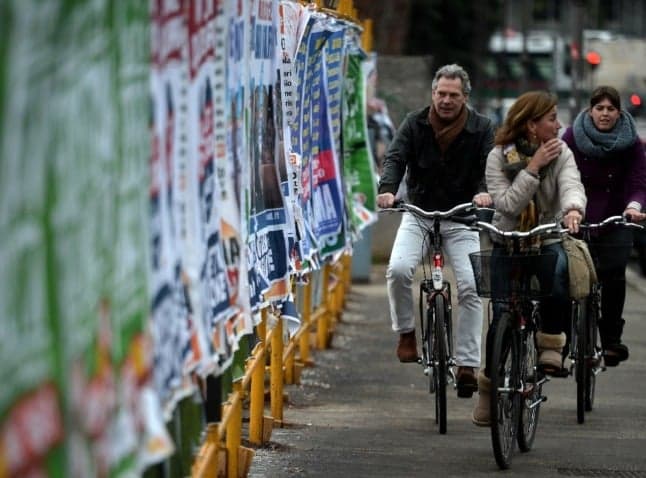Italy bans 'sexist and discriminatory' billboard adverts

The Italian government has approved new rules forbidding sexist or violent messages along Italy's roads.
Contained in Italy's updated Highway Code is a measure to ban certain types of images people see while driving.
Offensive gender stereotypes, messages which infringe on respect for individual freedoms, civil and political rights, religious beliefs or ethnicity are all now banned.
The measure also stipulates that any images that discriminate against sexual orientation, gender identity or physical or mental abilities are not allowed.
READ ALSO: Italy launches e-scooter clampdown and bigger fines for phone-using drivers
For anyone found violating the rule, authorisation to advertise can be removed and the material will be taken down. There was no mention of monetary fines for breaching this section of code.
The move has received a mixed response.
Lucio Malan, a senator with the far-right Brothers of Italy party, described the law change as "an ideological norm aimed at limiting freedom of expression," reported Italian newspaper La Stampa.
The change was included in the Infrastructure Decree, which governs the country’s laws relating to transport and public works.
Despite opposition from right wing parties to this particular section of it, the measure was approved along with other reforms to road regulations.
"How is it possible that in a decree concerning investments and safety of infrastructures, transport and road traffic, an ideological rule has been inserted, aimed at limiting freedom of expression, under the pretext that the exercise of this freedom cannot take place on roads and vehicles?" stated Malan.

Participants hold a banner reading "Zan law right now!" Photo by Tiziana FABI / AFP
Those against the new rule point to the issue of gender identity. It was this in part that led the Italian parliament to reject a bill aimed at fighting homophobia.
READ ALSO: What is Italy’s proposed anti-homophobia law and why is it controversial?
The law, proposed in May 2018 and known as the 'ddl Zan', sought to punish acts of discrimination and incitement to violence against gay, lesbian, transgender and disabled people.
But the upper house agreed to block its passage through parliament after it was approved last November by the lower house.
Far right members have claimed that this part of the Highway Code is the 'Zan Bill' under another name.
"This is completely unacceptable and was introduced by stealth," Malan added.
Jacopo Coghe, vice president of pro-life organisation 'ProVita' said, "Gender identity was not included with the Trojan horse of the Zan bill and now the government is surreptitiously trying again by including it in this law under the fig leaf, as usual, of discrimination."
Critics of the Zan Bill said it risked endangering freedom of expression and would have paved the way for "homosexual propaganda" in schools.
The section on sexist advertising in the Infrastructure Decree was introduced by MP Alessia Rotta of the centre-left Democratic Party and Raffaella Paita from the centrist Italia Viva Party.
"The amendment is the result of a long transversal project that allows us to give a social value to these issues," stated Paita.
Referring to the Zan Bill, she said, "In that case, gender identity was expressed in various forms, unlike in our amendment."

People hold a banner reading "against fascism, racism and sexism, everyday, in all cities''. Photo by TIZIANA FABI / AFP
"However, proposing and getting the amendment approved is proof that the political force I represent is trying to lend a hand on the issue of civil rights and that fighting alone will slow down progress.
"We have to work with a weaving logic to help those who suffer discrimination," she added.
Italy's advertising industry faced a backlash in 2017 when jewellery brand Pandora was accused of sexism over a Christmas ad that appeared across billboards in Milan.
Targeted at those buying presents for women, the advert read, "An iron, pyjamas, an apron, a Pandora bracelet. In your opinion, what would make her happy?"
The company responded with an acknowledgement to the "stereotypes we’re all familiar with in an ironic and playful way".
Another uproar came in 2015 when an Italian clothes brand was accused of sexism, suggesting that the wearer give it to their mother to wash because "it’s her job".
The ban on discriminatory adverts is just one of a raft of changes to road regulations for cars, e-scooters, motorbikes and pedestrians.
While some rules come into force immediately, this new regulation will be applied within 90 days.
Comments
See Also
Contained in Italy's updated Highway Code is a measure to ban certain types of images people see while driving.
Offensive gender stereotypes, messages which infringe on respect for individual freedoms, civil and political rights, religious beliefs or ethnicity are all now banned.
The measure also stipulates that any images that discriminate against sexual orientation, gender identity or physical or mental abilities are not allowed.
READ ALSO: Italy launches e-scooter clampdown and bigger fines for phone-using drivers
For anyone found violating the rule, authorisation to advertise can be removed and the material will be taken down. There was no mention of monetary fines for breaching this section of code.
The move has received a mixed response.
Lucio Malan, a senator with the far-right Brothers of Italy party, described the law change as "an ideological norm aimed at limiting freedom of expression," reported Italian newspaper La Stampa.
The change was included in the Infrastructure Decree, which governs the country’s laws relating to transport and public works.
Despite opposition from right wing parties to this particular section of it, the measure was approved along with other reforms to road regulations.
"How is it possible that in a decree concerning investments and safety of infrastructures, transport and road traffic, an ideological rule has been inserted, aimed at limiting freedom of expression, under the pretext that the exercise of this freedom cannot take place on roads and vehicles?" stated Malan.

Those against the new rule point to the issue of gender identity. It was this in part that led the Italian parliament to reject a bill aimed at fighting homophobia.
READ ALSO: What is Italy’s proposed anti-homophobia law and why is it controversial?
The law, proposed in May 2018 and known as the 'ddl Zan', sought to punish acts of discrimination and incitement to violence against gay, lesbian, transgender and disabled people.
But the upper house agreed to block its passage through parliament after it was approved last November by the lower house.
Far right members have claimed that this part of the Highway Code is the 'Zan Bill' under another name.
"This is completely unacceptable and was introduced by stealth," Malan added.
Jacopo Coghe, vice president of pro-life organisation 'ProVita' said, "Gender identity was not included with the Trojan horse of the Zan bill and now the government is surreptitiously trying again by including it in this law under the fig leaf, as usual, of discrimination."
Critics of the Zan Bill said it risked endangering freedom of expression and would have paved the way for "homosexual propaganda" in schools.
The section on sexist advertising in the Infrastructure Decree was introduced by MP Alessia Rotta of the centre-left Democratic Party and Raffaella Paita from the centrist Italia Viva Party.
"The amendment is the result of a long transversal project that allows us to give a social value to these issues," stated Paita.
Referring to the Zan Bill, she said, "In that case, gender identity was expressed in various forms, unlike in our amendment."

"However, proposing and getting the amendment approved is proof that the political force I represent is trying to lend a hand on the issue of civil rights and that fighting alone will slow down progress.
"We have to work with a weaving logic to help those who suffer discrimination," she added.
Italy's advertising industry faced a backlash in 2017 when jewellery brand Pandora was accused of sexism over a Christmas ad that appeared across billboards in Milan.
Targeted at those buying presents for women, the advert read, "An iron, pyjamas, an apron, a Pandora bracelet. In your opinion, what would make her happy?"
The company responded with an acknowledgement to the "stereotypes we’re all familiar with in an ironic and playful way".
Another uproar came in 2015 when an Italian clothes brand was accused of sexism, suggesting that the wearer give it to their mother to wash because "it’s her job".
The ban on discriminatory adverts is just one of a raft of changes to road regulations for cars, e-scooters, motorbikes and pedestrians.
While some rules come into force immediately, this new regulation will be applied within 90 days.
Join the conversation in our comments section below. Share your own views and experience and if you have a question or suggestion for our journalists then email us at [email protected].
Please keep comments civil, constructive and on topic – and make sure to read our terms of use before getting involved.
Please log in here to leave a comment.